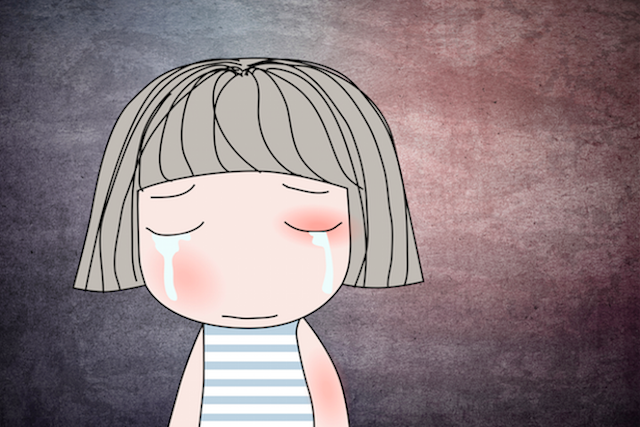
“Grief can be the garden of compassion.” ~Rumi
Have you ever had lower back pain? I once wrenched my back and walked at snail’s pace for weeks, crippled by pain. Lower back pain troubled me for years, until I found an exercise that reliably switches off the pain.
Have you ever lost a loved one? The anguish can seem unbearable.
Abolishing pain might seem a good idea, but please pause to consider this story.
I was once the doctor and scientist on a health “mission” with a major international organization. Our team included a vivacious and intelligent young lady called Sheryl Sandberg (now the Chief Operating Officer of Facebook). One of the diseases in our “portfolio” was leprosy.
Peripheral nerves of people with leprosy become infected by a germ. The skin supplied by such a nerve becomes anaesthetic. Lack of pain might seem like a blessing, at first glance.
A leprosy patient with an anaesthetic hand can, unfortunately, hold their hand in a flame. They keep injuring themselves unknowingly, gradually eroding their fingers, feet, and eyes.
It can be worse: there’s a Swedish province where some people feel no pain anywhere. That condition is inherited. People suffer severe deformities because they unknowingly twist and batter their own joints in the course of daily life.
Physical pain is often protective. A lack of physical pain can be a curse.
I was once playing hockey when I tripped and fell on an arm. I continued to play, with little pain, thanks to the endorphins (natural opioids) from vigorous exercise; but after the game the pain became excruciating. My mother took me to our doctor, who found a broken collarbone.
Let’s come to emotional pain.
I followed Sheryl’s progress with interest. She got married, but then the marriage ended.
She got a position in the White House, but then the presidential term ended. She got a position in Google, but then felt in need of a move. She got a position in Facebook, and finally seemed to be on top of the world: with a happy second marriage, wonderful children, and a thriving career.
Then she lost her husband suddenly in a freak holiday accident, while he was exercising.
Having suddenly lost my father some years earlier, I can somewhat understand the gut-wrenching anguish of such bereavement. Sheryl, however, movingly transcended her grief as she vowed to “kick the hell out of option B” (having lost “option A”) and still make a great life for her children.
You can feel deep emotional pain even without bereavement, especially if you have depression or anxiety. Could such pain ever be a useful part of life?
It helps to understand the science of pain. When you touch an open flame, your hand automatically springs back, thanks to protective reflexes at the spinal level. When pain is persistent, at least four levels in your brain process the pain.
One part of your brain (your somato-sensory cortex) receives the news about the pain.
A second part (your anterior insula) assesses how severe this pain is: merely unpleasant or mild or agonizing etc.
A third part (your anterior cingulate cortex) clothes this pain in emotional garments: such as feelings of anger, frustration etc.
A fourth part of your brain (your prefrontal cortex) prompts thoughts and action.
Pain, therefore, is a combination of what happens to us and how we respond.
How can you make pain less oppressive?
1. Observe.
I once dropped a heavy stool with sharp edges on my foot. I decided, in that instant, to calmly observe the ensuing sensations. The excruciating initial pain rapidly gave way to a burning sensation, which was somewhat bearable.
Calm observation of your body can make even emotional pain somewhat bearable. The more calmly you observe your bodily sensations while feeling sad or anxious, the less you dwell on your emotional turmoil.
Music-making and other creative activities can help you stay calm in the face of suffering.
2. Seek help.
Physical pain can be your body’s way of protecting you. However, persistent pain requires attention.
My pain after the hockey injury drove me to seek medical attention. My lower back pain drove me to seek an exercise that works.
My father, on his deathbed, wanted merely to be more comfortable, to hug his family, and to have a sip of tea to help him cope with the many medical tubes invading his face. On a deathbed, pain control can transform life.
If you have a chronic painful condition, sympathetic professional help can often control the pain.
Emotional pain can sometimes seem overwhelming. If sadness threatens to drown you, seek help without delay. Let friends and family know, get professional help, allow yourself a medically prescribed life-jacket.
Healing always takes time, whether your wounds are physical or emotional. Compassionate people and professional help can keep you afloat, gifting you time to heal yourself.
3. Learn from others.
No matter how bad things seem, the experiences of others can be reassuring. Thousands have come through suffering as severe as yours, or worse. Besides, your vulnerability can attract compassion.
Make sure you reach out to others for help. It can be enough to say “I’m hurting, please help me.” People can be surprisingly compassionate, as I discovered once when forced to use crutches.
What has helped many others could well help you. Take courage, and hold on to hope.
4. Give it meaning.
I know of one person with leprosy whose leg needed to be amputated because he burnt himself severely by soaking a leg in unexpectedly hot water. It’s relatively easy to see protective pain as a gift.
How can you give emotional pain a positive meaning?
Emotional pain, too, can stop you from brutalizing yourself. When a boss repeatedly treats you unfairly, or someone repeatedly treats you with hostility or betrayal or abandonment, you know when enough is enough. However, when you turn against yourself, you can feel trapped.
If you fail to give emotional pain a positive meaning, you might start to feel bad about feeling bad. Bit by bit, self-loathing can gain a foothold.
Instead of judging yourself for feeling bad, try visualizing your suffering as a pointer towards a new life. It may take time to learn and grow, so it’s helpful to hear stories of success. After every setback, believe that you, too, can “kick the hell out of option B.”
5. Unlock the best in you.
Pain, suffering, and death are inescapable. Our own suffering encourages us to become more compassionate, to treat others who suffer as if they were our own loved ones. Our suffering can be a key that unlocks our compassion.
There are too many examples of hatred in the world, of violence, cruelty, and contempt for human beings. The world has witnessed great tussles between good and evil, as happened during World War 2. The willingness of people then, to suffer or even die for a just cause, helped civilization to survive.
When we’re moved by the misfortunes of others, and respond generously, we gradually replace a civilization of hatred with a civilization of love. This can happen within our family, our community, our town, our country and our world.
Sheryl has a platform as a senior executive in a major corporation, which she uses to campaign for better opportunities for women. Bill Gates has turned his billions to good use, by driving a number of important health and education initiatives. We might have less influential positions, but we’re just as capable of compassionate action right where we are.
6. Persevere.
My late mother-in-law was incapacitated by severe rheumatoid arthritis, which kept her in frequent pain. Her response was to do as much as she could, treat everyone with compassion, and look for the best in every situation.
Her example of maturity, endurance, and spiritual greatness—in the face of suffering—remains an inspiration to me.
7. Grow confident.
Pain, suffering, and death are unavoidable. They can be especially cruel if you treat them as masters. Try taming pain by interpreting it as an ally, an educator, and an invitation to grow into your most compassionate self.
Endurance of suffering builds character and character produces hope: the confidence that nothing in life will get the better of you, nothing will rob you of your human dignity. Instead, your endurance of suffering can gift you with the confidence to cope with any challenge.
—
Live courageously and suffering might bend you, but won’t break you. Instead, you might well become a compassionate inspiration to others, just as my late mother-in-law is to me.
In your darkest hour, believe that your suffering is helping to replace a civilization of hate with a civilization of compassionate love. Then, no matter how painful your predicament, your horizon will remain luminous.
What are your own experiences and insights about pain and suffering?
Crying girl image via Shutterstock
About Joel Almeida
Joel Almeida PhD mentors busy doctors and other professionals to protect the one thing that makes all of life better: their brain. His science-based Brain Care guide reveals 10 one-minute practices for better brain health at any age, with more peace and joy now and lowered risk of Alzheimer’s. Now you, too, can get the guide (free today).













 Though I run this site, it is not mine. It's ours. It's not about me. It's about us. Your stories and your wisdom are just as meaningful as mine.
Though I run this site, it is not mine. It's ours. It's not about me. It's about us. Your stories and your wisdom are just as meaningful as mine.
I live with severe endometriosis so Pain is somewhat this thing I have to live with everyday, I loved reading this post and would like to add a few thoughts :
– Pain is a feeling and a nerve sensation, like explained here with the 4 parts of the brain. Focusing on pain with stress will increase pain, I try to just acknowledge it like any other physical sensation (hunger, cold and so on), to allow my brain to move on.
– Live as healthy a life as possible, I drink a lot of water, sleep 8 hours at night, eat organic veggies and food. I try to exercise as often as possible to produce endorphins (natural pain killer). Everything that can help your body deal with the pain will help your mind not focusing on it.
– Focus on ther sensations. I knit, colour, crochet, whatever can make me feel something physical (the yarn running through my fingers, the paper under my hand) while distracting my mind from the pain.
– Stress is the enemy ! When I am stressed, the pain is worse, always. But when I have new pains (endometriosis tend to spread) I stress. So Meditation, deep breathing, chamomille herbal tea, everything that helps with stress helps with pain.
– Read Tiny Buddha 🙂 This is a place that has helped me a lot !
I probably still have a lot to learn and adapt but a year ago I had no life anymore, I had to leave my job, laid in bed for days feeling like I was rolled over by a truck over and over again and now I am little by little coming back to life, because of all those little tips read online, told by doctors, I am not less sick but I am learning to live with it.
I hope it helps others 🙂
Thanks, Lucette, for your powerful insights and for sharing your experiences. Congratulations for cultivating such an empowering state of mind! It’s so encouraging to others. Your positive spirit is like a light that cannot be put out by the darkness of your suffering. Best wishes as you continue your brave journey.
Joel
Thanks for sharing this. I would love to know what your exercise for low back pain is!
You’re welcome, Tricia. It involves strengthening of certain muscles. It’s a bit detailed. You might want to follow the link in the biography above. That’s where detailed instructions will be put up in due course.
Best wishes.
Joel
All of our experience, including our pain, is what we require in order to grow and move forward. We can choose to listen to our bodies and minds and find the path of healing that works for us in that moment.
Thanks, Bethany, for sharing your insights. Yes, even pain can be seen as a gift, helping to lead us to healing.
Best wishes,
Joel